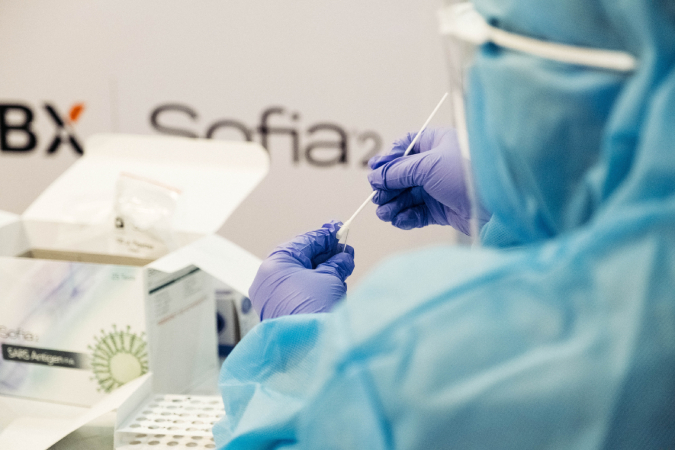The rapid testing, which the VU will start next week, does not mean an immediate loosening of the coronavirus restrictions on campus. Nevertheless, it is important that invited students participate, says Marcel Nollen of the Executive Board. “This way we can contribute to opening up the whole of society.”
Somewhere next week, the VU will start its much-discussed pilot with rapid tests. In the VU main building, on the elevation near the VU restaurant, there will be a rapid test street where daily about 200 students with practical classes can get tested for the coronavirus.
“All on a voluntary basis,” says Marcel Nollen of the Executive Board. The students receive the results within half an hour, “between fifteen minutes and half an hour”, says Nollen. To this end, the VU, together with ROC Amsterdam, the Amsterdam University of Applied Sciences and the Amsterdam department of the Haagse Hotelschool, has partnered up with an “external company”, which will set up such a test street at each of the four institutions.
More freedom
“We want to contribute to a safe return to physical education,” says the Executive Board member. The initial impression was that the rapid tests would immediately make it possible to have more freedom on campus, but that is not the case.
“We are still bound to national coronavirus regulations. All coronavirus rules will therefore remain in place, such as keeping your distance, washing your hands and staying at home in case of symptoms, ”says Nollen. “But we hope that at some point it can lead to a loosening of the restrictions by collecting all kinds of data. In this way, we contribute to the opening of society across the country. That is why it is important that invited students participate.”
The VU will be collecting data. For example, she wants to know how rapid tests work logistically, what the willingness among students is to get tested, whether they will behave more risky after the test and what the influence is on the infection rates.
Practical classes
Such pilots are carried out in other university cities, for example Groningen and Delft. But while Groningen focuses on physical exams with the tests, the VU opts for practical classes.
“Because we want those to open up again first,” says Nollen. “Suppose we can go back to campus in September because everyone is vaccinated by then, then it is possible that the 1.5 metre rule will still apply. In some cases, an exception could be made thanks to rapid testing. And in any case, we will have gained a lot of experience with that. ”
Privileges for tested students
The 200 students who are tested daily are just a small selection of the approximately 3000 students who come to campus every day. So while positively tested students must leave campus, some of the untested students may be walking around with COVID without knowing it. For that reason, a loosening of the restrictions is not automatically linked to the pilot, says Nollen. “That is of course the ultimate goal, but first we’ll need evidence for that.”
It could be that the campus will end up “in a different phase” in terms of limitations, according to Nollen. “In that case, you could grant privileges to students who have been tested, for example letting go of the 1.5 metres distance, so that we can use the space on campus more intensively.”
According to Nollen, this does not create a dichotomy on campus, because the privileges can simply be obtained by getting tested and of course the education remains accessible to untested students. Rather, you could think of a room with tested students and a room with untested students who can follow the same lecture through an online stream.
Privacy
So it is students who go to campus for a practical class who can register for a test with a link and reserve a time. They will see the results on their phone. “And we use the data for research, but everything is completely anonymous,” Nollen assures us. “We strictly observe the rules of privacy and do not know which students have tested positive. You will not be stigmatized by us. ”
“We don’t know how it will develop,” says Nollen. “But we are there and it’s going to be an adventure.”
